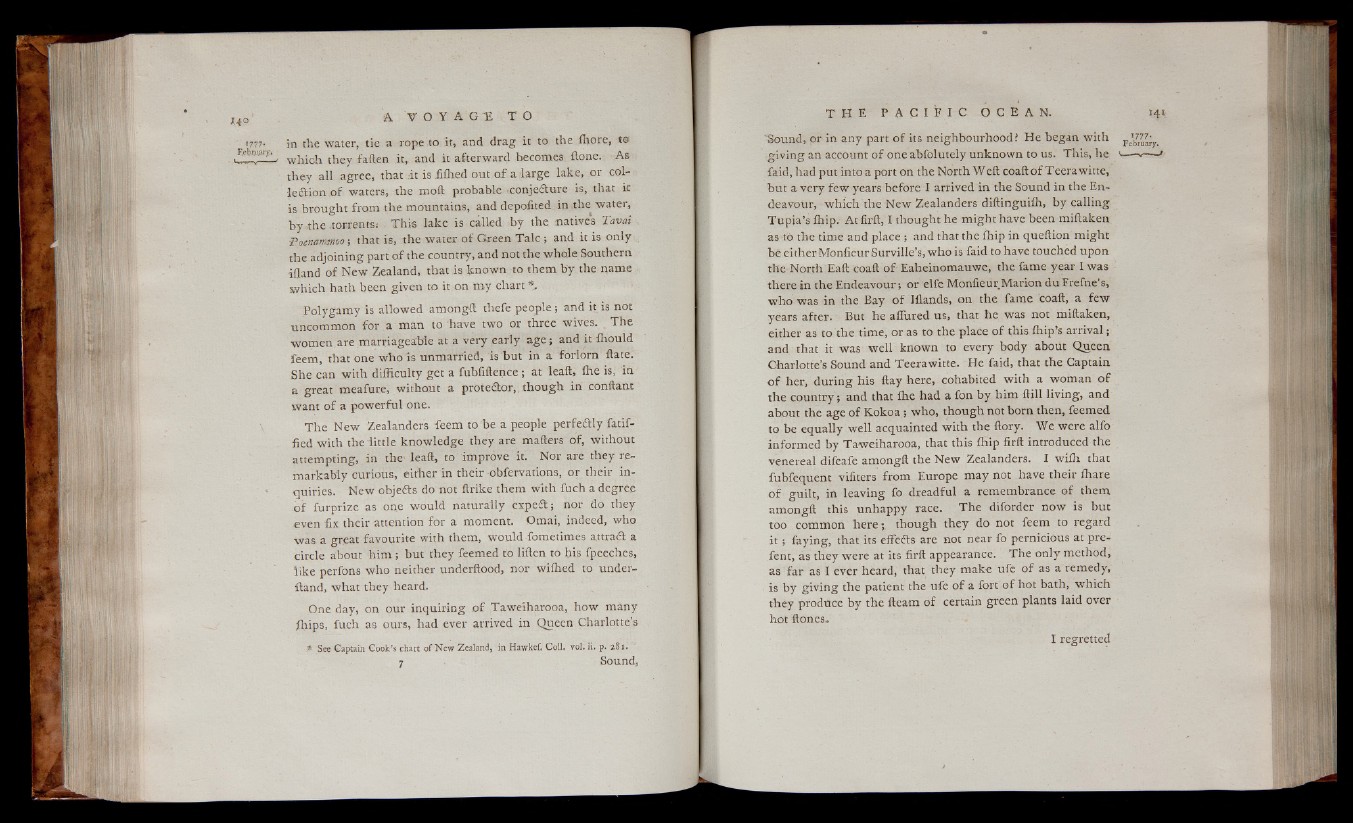
in the water, tie a rope to it, and drag it to the ihore, t©
which they fallen it, and it afterward becomes Hone. As
they all agree, that -it is iiihed out of a -large lake, or collection
of waters, the moll probable conjecture is, that it
is brought from the mountains, and depofited in the water,
by the .torrents: This lake is called by the natives Tavai
Poenammw; that is, the water of Green Talc ; and it is only
the adjoining part of the country, and not the whole Southern
illand of New Zealand, that is known to them by the name
which hath been given to it on my chart *,
Polygamy is allowed amongft thefe people; and it is not
uncommon for a man to have two or three wives. The
women are .marriageable at a very early a g e ; and it ihould
feem, that one who is unmarried, is but in a forlorn ftate.
She can with difficulty get a fubfiftence; at leaft, ffie is, in
a great meafure, without a prote&or,, though in conftant
want of a powerful one.
The New Zealanders feem to be a people perfectly fatif-
fied with the little knowledge they are matters of, without
attempting, in the leaft, to improve it. Nor are they remarkably
curious, either in their Obfervations, or their inquiries.
New objects do not ftrike them with fuch a degree
o f furprize as one would naturally expect; nor do they
even fix their attention for a moment. Omai, indeed, who
was a great favourite with them, would fomedmes attradl a
circle about him ; but they feemed to liften to his fpeeches,
like perfons who neither underftood, nor wiffied to under-
iland, what they heard.
One day, on our inquiring of Taweiharooa, how many
ffiips, fuch as ours, had ever arrived in Queen Charlotte’s
* See Captain Cook's chart of N ew Zealand, in HawkeC Coll. vol. li. p. 281.
7 Sound,
‘Sound, or in any part of its neighbourhood? He began with
giving an account of one abfolutely unknown to us. This, he 1---------'
faid, had put into a port on the North Weft coaft of Teerawitte,
but a very few years before I arrived in the Sound in the Endeavour,
which the New Zealanders diftinguiffi, by calling
Tupia’s ffiip. At firft, I thought he might have been miftaken
as t© the time and place; and that the ffiip in queftion might
be eitherMonfieurSurville’s, who is faid to have touched upon
the North Eaft coaft o f Eaheinomauwe, the fame year I was
there in the Endeavour; or elfe Monfieur Marion duFrefne’s,
who was in the Bay of Iilands, on the fame coaft, a few
years after. But he allured us, that he was not miftaken,
either as to the time, or as to the place of this ffiip’s arrival;
and that it was well known to every body about Queen
Charlotte’s Sound and Teerawitte. He faid, that the Captain
of her, during his ftay here, cohabited with a woman of
the country; and that ffie had a fon by him ftill living, and
about the age of Kokoa; who, though not born then, feemed
to be equally well acquainted with the ftory. We were alfo
informed by Taweiharooa, that this ffiip firft introduced the
venereal difeafe amongft the New Zealanders. I wiffi that
fubfequent vifiters from Europe may not have their ffiare
o f guilt, in leaving fo dreadful a remembrance of them
amongft this unhappy race. The diforder now is but
too common here; though they do not feem to regard
i t ; faying, that its efFets are not near fo pernicious at pre-
fent, as they were at its firft appearance. The only method,
as far as I ever heard, that they make ufe of as a remedy,
is by giving the patient the ufe of a fort of hot bath, which
they produce by the fteam of certain green plants laid over
hot Hones.
I regretted